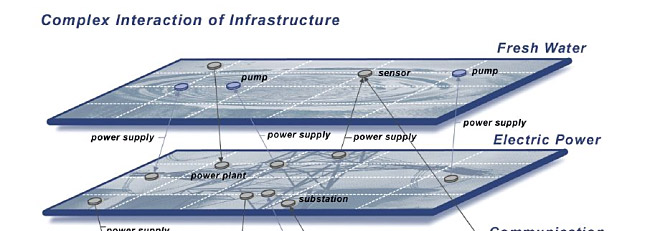Natural Disasters and Transportation Infrastructure
The Institute for Economic Policy Research (IWW) analyses the effects of natural disasters on transportation in various subprojects. Scientific advisor is Prof. Dr. Kay Mitusch.
Rapid assessment of indirect losses after natural events
Since 2010 the IWW has been analyzing the effects of natural events on traffic and the economy. The project aims to identify loss drivers and to establish a methodology for rapid indirect loss assessment triggered by transportation system disruptions. The results shall contribute to improve risk and disaster management measures.
PhD thesis on the identification of critical road infrastructures based on their indirect loss potential
In the CEDIM supported thesis “The identification of critical road infrastructures – the case of Baden-Wuerttemberg” Carola Schulz developed a methodology to monetarily assess the indirect losses of unexpected road disruptions. Depending on the duration of road closure different trip making behavioral changes are taken into account. The potential indirect losses of each road section form the basis for a criticality ranking. Furthermore the thesis analyses the influence of multiple simultaneous road interruptions on the criticality of road sections. The case study Baden-Wuerttemberg demonstrates the application of the methodology for loss calculation and criticality assessment as well as two simultaneous multiple road failure scenarios. Latter were developed in cooperation with other CEDIM members from the „Institut für Massivbau und Baustofftechnologie (IMB)“ and the “Institut für Wasser und Gewässerentwicklung (IWG)”. In addition the thesis incorporates the probabilities of road failure for a better interpretability of the results concerning the need for risk management actions.
Risk management strategies in logistics and infrastructure networks
In their collaborative project entitled “Risk Management Strategies in Logistics and Infrastructure Networks” fostered by the German Ministry of Education and Research scientists from the IWW and the Technical University in Berlin are working closely with logistics experts from 4flow AG and Kühne + Nagel (AG & Co.) KG to analyze the extent to which catastrophes can impact logistics systems. The project’s main focus is on investigating existing as well as potential future risk management strategies for logistics companies, infrastructure operators and government institutions as well as on probable repercussions based on specific catastrophe scenarios. For example, such strategies will be developed by taking into consideration possible catastrophe scenarios in relation to developing transportation networks, adjusting emergency inventory levels or providing alternative supply chains. The project will assess the economic relevance as well as the consequences for individual companies and leverage this insight in order to derive practical and scientifically-based strategies. New simulation models will be developed based on these findings and serve as a basis for further analyses at a corporate level as well as at a macroeconomic level.
For more information see: www.rm-log.de
Publications
| Khazai, B.; Merz, M.; Schulz, C. und Borst, D. | An Integrated Indicator Framework for Spatial Assessment of Industrial and Social Vulnerability to Indirect Disaster Losses. | Eingereicht bei Natural Hazards am 26.1.2011. | ||||
| Mitusch, K., Friedrich, H. und Schulz, C. | Wetterereignisse und Verkehr – am Beispiel von Sturm Daisy 2010. | 6. ExtremWetterKongress 2011, Hamburg. | ||||
| Lüders, S. und Schulz, C. | Auswirkung von Naturkatastrophen auf das Verkehrsverhalten. | Arbeitspapiere Güterverkehr und Logistik. Nr. 4, 2010. http://digbib.ubka.uni-karlsruhe.de/volltexte/1000020058. urn:nbn:de:swb:90-200580 | ||||
| Mitusch, K. und Friedrich, H. | Wenn die Natur verrückt spielt: Auswirkungen von Naturereignissen auf die Volkswirtschaft und Tourismus-Unternehmen – am Beispiel vom Ausbruch des Eyjafjallajökull 2010. | 60. DRV-Jahrestagung 2010, Agadir, Marokko | ||||
| Schulz, C. | The identification of critical road infrastructures ‐ The case of Baden‐Wuerttemberg. | Winterseminar der Gesellschaft für Regionalforschung, 2009: Innsbruck, Österrreich. | ||||
| Schulz, C. und Khazai, B. | An indicator-based approach for critical road infrastructure identification. | International Disaster and Risk Conference (IDRC) 2008: Davos, Schweiz. | ||||
| Tyagunov, S., Schulz, C., Wenzel, F., Stempniewski, L., Kostenko, M. | Modelling and analysis of transportation networks in earthquake prone areas | Proceedings of the 8th Pacific Conference on Earthquake Engineering, 5th-7th December 2007, Singapore. | ||||
| Schulz, C. | Risikokartierung: Verkehrsinfrastrukturen. | Geographie und Schule. 170 (Dezember 2007). S. 50-51. | ||||
| Schulz, C. | Identification of critical transport infrastructures | Proceedings of the 8. Forum DKKV/CEDIM: Disaster Reduction in Climate Change 15./16.10.2007, Universität Karlsruhe (TH). | ||||
| Ott, A. und Schulz, C. | Risk assessment of railway infrastructure networks due to force majeure | Proceedings of the 15th International Symposium: "Towards more competitive European rail system", EURNEX -Zel 2007, volume 2, 220-227, 2007 | ||||
| Ott, A. und Schulz, C. | An economic approach of treating external risks from the point of view of an independent infrastructure manager | Proceedings of the Infraday, Berlin, 2007 |



